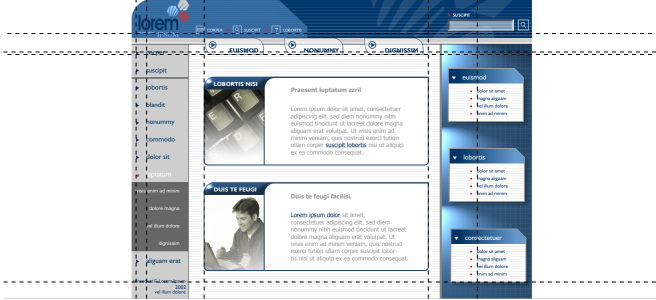Set up guidelines
Guidelines are lines that can be placed anywhere in the drawing window to aid in object placement. In some applications, guidelines are known as guides.
There are three types of guidelines: horizontal, vertical, and angled. By default, the application displays guidelines that you add to the drawing window, but you can hide them at any time. You can also use objects as guides.
You can set guidelines for individual pages or you can set guidelines for the entire document. For more information about local and master guidelines, see Local layers and master layers.
You can add a guideline wherever you need one; however, you can also choose to add preset guidelines. There are two types of preset guidelines: Corel presets and user-defined presets. Examples of Corel presets include guidelines that appear at 1-inch margins and guidelines that appear at newsletter column borders. User-defined presets are guidelines whose location you specify. For example, you can add preset guidelines that display margins at a distance you specify or that define a column layout or grid. You can remove guidelines at any time.
You can have objects snap to the guidelines, so that when an object is moved near a guideline, it can only be centered on the guideline or lined up on either side of the guideline.
Guidelines use the unit of measure specified for the rulers. For information about ruler settings, see To customize ruler settings. By default, all guidelines are shown at the drawing scale specified in the Edit Scale dialog box. You can choose not to display guideline coordinates at scale, but rather to show the actual position of a guideline on the page.
Guidelines can be placed in the drawing window to aid in object placement.
To display or hide the guidelines
You can also display or hide the guidelines by clicking Window ![]() Inspectors
Inspectors ![]() Guidelines and clicking the Show or hide guidelines button
Guidelines and clicking the Show or hide guidelines button .
You can also access additional guideline options by clicking Layout ![]() Document Preferences, and then clicking Guidelines in the left pane of the dialog box that appears.
Document Preferences, and then clicking Guidelines in the left pane of the dialog box that appears.
To add a horizontal or vertical guideline
You can also add a guideline by dragging from the horizontal or vertical ruler to the drawing window.
To add an angled guideline
You can also add an angled guideline by dragging from the horizontal or vertical ruler in the drawing window, and typing a value in the Angle of rotation box on the property bar.
To use an object as a guide
The object appears as a custom guide in the Guidelines inspector.
Custom guides cannot be edited in the Guidelines inspector.
To set guidelines for the entire document
The guidelines that you set on the Guides (all pages) layer of the Master page appear on all pages of the document. These guidelines appear in addition to any guidelines that you set for individual pages.
To add preset guidelines
To remove a guideline
You can also remove individual guidelines by dragging them off the document window, or clicking a guideline with the Pick tool and pressing Delete.
To delete a preset guideline, click Layout ![]() Document Preferences. In the left pane of the dialog box that appears, click Guidelines, and then click Presets. Disable the check box beside the preset guideline that you want to delete.
Document Preferences. In the left pane of the dialog box that appears, click Guidelines, and then click Presets. Disable the check box beside the preset guideline that you want to delete.
To have objects snap to the guidelines
You can also set objects and editable areas to snap to a guideline by clicking Window ![]() Inspectors
Inspectors ![]() Guidelines and clicking the Snap to guidelines button
Guidelines and clicking the Snap to guidelines button or by pressing Shift + Command + G.
To display the actual position of a guideline on the page
The guideline coordinate no longer matches the value on the property bar and the rulers. For example, if the drawing scale is 1:100, a guideline positioned at 100 mm at scale appears at 1.000 mm when the Show at scale command is disabled.
